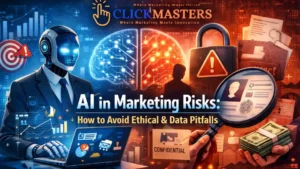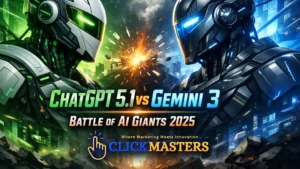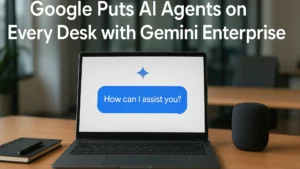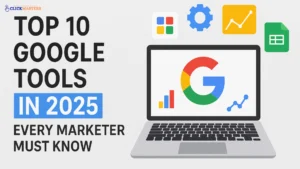The digital world has undergone a drastic shift as artificial intelligence revolutionizes how search engines understand, process, and rank web content. This transformation isn’t just changing the technical aspects of search engine optimization; it’s also changing the way we approach it. It fundamentally changes how businesses approach Digital marketing and content strategy.
In the rapidly evolving world of digital marketing, Artificial Intelligence (AI) has become especially relevant in Search Engine Optimization (SEO). Understanding how search engines use AI to rank websites is crucial for businesses, content creators, and marketers aiming to stay competitive in the SERPs (Search Engine Results Pages).
Table of Contents
The AI Revolution in Search: Understanding the Current Landscape
Search engines have evolved keyword-matching systems to AI-powered platforms that understand context, intent, and user behavior. Recent research reveals that as of June 2025, a staggering 57% of Search Engine Results Pages (SERPs) feature AI overviews. That’s up from just 25% of searches in August of 2024, demonstrating the rapid adoption of AI in search results.
This dramatic increase in AI integration represents more than just a technological upgrade’s a complete paradigm shift in how search engines deliver information to users. The implications for SEO professionals, content creators, and digital marketers are profound and far-reaching.
What Is AI in SEO?
AI in SEO refers to the use of machine learning algorithms and natural language processing (NLP) by search engines to deliver better, more relevant search results. AI helps search engines understand the intent behind search queries, the context of content, and user behavior to rank web pages more accurately.
Google uses AI in 100% of its search queries, thanks to algorithms like RankBrain and BERT ( Google AI Blog)
How Search Engines Use AI to Rank Websites
Major search engines like Google, Bing, and Yahoo use AI-driven algorithms to tell which websites deserve top rankings. Google’s RankBrain, an AI algorithm introduced in 2015, changed the SEO game forever.
Google RankBrain: The Pioneer of AI-Driven Search
Google RankBrain, launched in 2015, was the first major AI algorithm that had a great impact on SEO rankings. Algorithms like RankBrain, BERT (Bidirectional Encoder Representations from Transformers), and MUM (Multitask Unified Model) play important roles in understanding language and user intent, basically impacting how SEO and content strategies must adapt to succeed.
RankBrain uses machine learning to interpret search queries, especially those that haven’t been seen before. It helps Google to understand the relationship between concepts and provides more relevant results based on user intent rather than just keyword matching. 70% of marketers say AI has significantly improved their SEO performance. (Statista 2025 AI Marketing Report).
BERT: Understanding Natural Language Processing
Google’s BERT algorithm represents a significant advancement in natural language understanding. BERT will impact 1 in 10 of all search queries. This is the biggest change in search since Google released RankBrain. BERT’s ability to understand context in language has made it essential for search engines to comprehend conversational queries and long-tail keywords. Only 0.63% of users click on results from the second page of Google (Source: Backlinko)
Machine Learning-Based Ranking Systems
Modern search engines depend on machine learning algorithms for ranking. Google AI used machine learning algorithms like RankNet and LambdaRank to rank the search results, prioritizing the quality of information. These algorithms measure a webpage’s content quality through the relevance of keywords, backlinks, user behavior, and other critical ranking factors. Websites using AI content optimization tools like Surfer SEO or Frase see a 30%+ increase in organic traffic. (HubSpot Research)
Visual & Multimedia Recognition
With the rise of visual search, AI can now process images, videos, and even voice inputs, ranking them based on metadata, alt tags, and relevance 27% of global online searches are now done via voice(Think With Google)
AI and machine learning are expected to drive over 80% of marketing technology by 2026(Gartner).
Key AI Technologies Impacting SEO
| AI Technology | Role in SEO |
| NLP (Natural Language Processing) | Helps understand the meaning behind words |
| Machine Learning | Enables adaptive ranking based on data patterns |
| Neural Matching | Matches concepts rather than keywords |
| Computer Vision | Understands and ranks visual content |
AI and machine learning are expected to drive over 80% of marketing technology by 2026 (Gartner)
Optimizing for AI-Driven Search Engines
Content Strategy Adaptation
Creating content that is relevant with AI algorithms requires a basic shift.
Focus on User Intent: Rather than targeting specific keywords, create content that is relevant to the user’s needs and questions. AI algorithms excel at understanding when content fulfills the searcher’s intent.
Develop Topic Clusters: Organize content around topic clusters rather than individual keywords. This approach aligns with AI’s semantic understanding capabilities and helps establish topical authority.
Prioritize E-A-T (Expertise, Authoritativeness, Trustworthiness): AI algorithms are increasingly good at evaluating content credibility. Ensure your content demonstrates expertise, is authored by qualified individuals, and comes from authoritative sources.
Technical Optimization for AI
Implement Advanced Schema Markup: Help AI understand your content by implementing detailed structured data. This includes product schemas, FAQ schemas, and article schemas that provide context to AI crawlers.
Optimize for Voice Search: With AI’s natural language processing capabilities, optimize content for conversational queries and long-tail keywords that people use in voice searches.
Enhance Page Experience: AI algorithms heavily weigh user experience factors. Ensure your site loads quickly, is mobile-responsive, and provides intuitive navigation.
The Future of AI in Search Engine Optimization
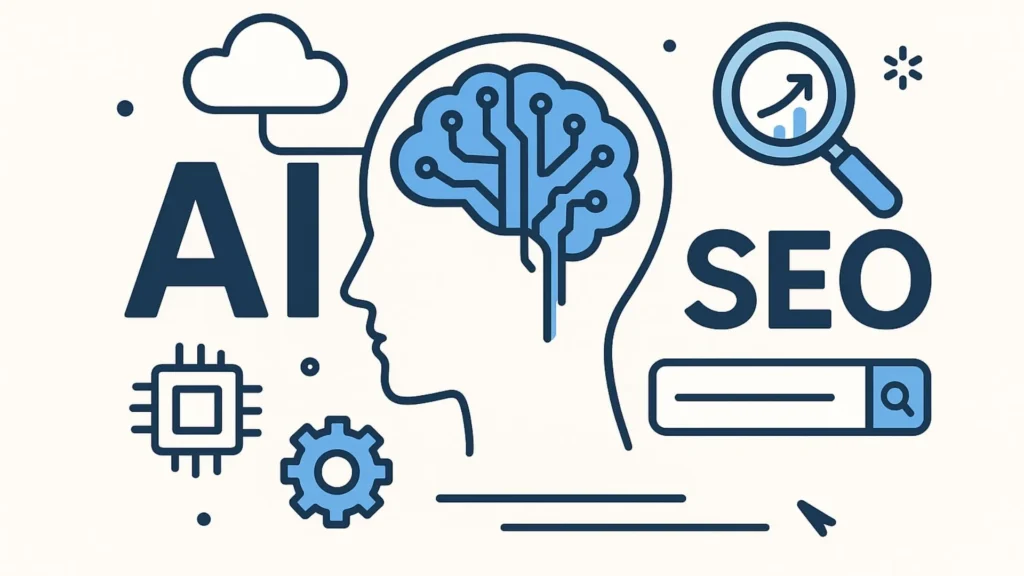
Emerging Trends and Technologies
The AI search landscape continues to evolve rapidly. Several key trends are shaping the future:
Multimodal Search: AI is increasingly incorporating image, video, and audio content into search results, requiring SEO strategies to optimize for multiple content types.
Personalization at Scale: AI algorithms are becoming more adept at personalizing search results based on individual user behavior, location, and preferences.
Real-Time Content Analysis: AI can now analyze and rank content in real-time, making fresh, timely content more valuable than ever.
Preparing for the AI-First Future
Organizations must adapt their SEO strategies to remain competitive in an AI-dominated search environment:
Invest in AI SEO Tools: Include AI-powered SEO tools for keyword research, content optimization, and performance analysis.
Develop AI-Friendly Content: Create content that AI algorithms can easily understand and categorize, using clear structure, relevant headings, and comprehensive coverage of topics.
Focus on User Experience: As AI becomes better at understanding user satisfaction, prioritize creating genuinely helpful, engaging content that serves user needs.
Challenges and Opportunities
Common Challenges
Algorithm Volatility: AI algorithms can change more frequently than traditional ranking factors, requiring constant adaptation.
Content Complexity: Creating content that satisfies both human readers and AI algorithms requires a sophisticated understanding of both audiences.
Technical Requirements: AI-optimized SEO often requires more advanced technical implementations.
Opportunities for Growth
Early Adopter Advantage: Organizations that successfully adapt to AI-driven search can gain significant competitive advantages.
Improve the User Experience: AI algorithms reward sites that provide exceptional user experiences, aligning business goals with user needs.
Content Differentiation: AI’s ability to understand content quality creates opportunities for high-quality content to stand out.
Conclusion: Embracing the AI-Driven Future
The linking of artificial intelligence into search engine algorithms is one of the most important changes in digital marketing history. In SEO, adapting to the influence of RankBrain is far more than an option but a necessity. Google’s AI-driven algorithm has fundamentally changed the way search results are determined, emphasizing user intent, content quality, and a positive overall experience.
The future of SEO is not about outsmarting AI algorithms, but about creating content and experiences that AI recognizes as genuinely valuable to users. By understanding how AI evaluates and ranks content, businesses can create more effective, user-focused digital strategies that drive meaningful results.
Looking to supercharge your SEO strategy with AI?
Click Master Digital Agency offers expert-led AI SEO services tailored to your business goals.
Click Master Digital Agency helps businesses grow by leveraging AI-powered SEO strategies tailored to Google’s evolving algorithms. From smart keyword targeting to content optimization and structured data implementation, we ensure your website ranks higher and attracts the right audience. Let AI elevate your digital presence with expert-driven SEO solutions.
Frequently Asked Questions (FAQs)
What is AI SEO, and how does it differ from traditional SEO?
AI SEO refers to search engine optimization strategies that are specifically designed to work with artificial intelligence algorithms used by search engines like Google. Unlike traditional SEO, which focused primarily on keyword density and backlinks, AI SEO emphasizes user intent, content quality, semantic understanding, and user experience signals. AI algorithms can understand context, natural language, and user behavior patterns, making them more sophisticated than earlier ranking systems.
How much of Google’s search results are influenced by AI?
According to recent data, 57% of Search Engine Results Pages (SERPs) feature AI Overviews as of June 2025, representing a significant increase from 25% in August 2024. Additionally, Google’s AI algorithms like RankBrain impact virtually all search queries, with BERT affecting 1 in 10 of all search queries.
What are the most important AI algorithms I should know about for SEO?
The key AI algorithms affecting SEO include:
- RankBrain: Google’s machine learning algorithm that helps interpret search queries and understand user intent
- BERT: Focuses on natural language processing and understanding context in search queries
- MUM (Multitask Unified Model): Handles complex, multi-faceted queries across languages and formats
- Core Web Vitals: AI-driven metrics that measure user experience factors like page speed and interactivity
How can I optimize my content for AI-driven search engines?
To optimize for AI algorithms:
- Focus on user intent rather than just keywords
- Create comprehensive, in-depth content that thoroughly covers topics
- Use natural language and conversational tone
- Implement structured data markup
- Prioritize page speed and mobile optimization
- Build topical authority through content clusters
- Ensure your content (E-A-T)
What tools should I use for AI SEO?
Popular AI SEO tools include:
- SEMrush and Ahrefs: For AI-powered keyword research and competitor analysis
- Clearscope and MarketMuse: For content optimization and semantic SEO
- BrightEdge and Conductor: For enterprise-level AI SEO management
- Google Search Console: For monitoring AI Overview appearances and performance
- PageSpeed Insights: For Core Web Vitals optimization
How do I measure the success of my AI SEO efforts?
Key metrics to track include:
- Organic click-through rates from search results
- Dwell time and user engagement signals
- Featured snippet and AI Overview appearances
- Core Web Vitals scores
- Voice search visibility
- Semantic keyword rankings
- Overall, organic traffic quality and conversion rates




